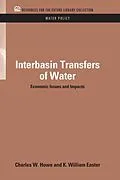Howe and Easter analyze existing evidence on direct and indirect benefits attributable to water, as well as the potential costs of interbasin transfers, and examine feasibility of alternatives.
Originally published in 1971
Autorentext
Charles W. Howe, K. William Easter
Zusammenfassung
This book brings together chapters by academics, researchers and practitioners to analyse how crimes such as sex work, domestic violence and rape and sexual assault have risen up the Government agenda in recent years. For example, the 'Paying the Price' consultation exercise on sex work in 2004, and recent legislation around sex crimes, including the Sex Offences Act (2003). This is a multi-disciplinary, social scientific, pro-feminist collection, which draws upon practice, empirical research, documentary analysis and overviews of research in the areas of sex work and sexual violence. Within Sex as Crime there are two distinct sub-sections: 'Sex for Sale' and 'Sex as Violence', but the broader and overriding link of sex as crime remains a paramount theme that spans the collection. Chapters include discussions of the impact of new regulations on street sex workers, and of street sex work on community residents, the use of the internet by men who pay for sex and men who sell it, sexual violence and identity, sex crimes against children and protecting children online and working with sex offenders. Other chapters explore reasons for such offending behaviour.
Inhalt
Chapter 1 Introduction; Chapter 2 The Economic Evaluation of Interbasin Transfers of Water: Conceptual Framework; Chapter 3 Direct and Secondary Water Benefits: Studies of the Benefits from Water in Agriculture; Chapter 4 Long-Term Regional Impacts and National Benefits of an Interbasin Transfer; Chapter 5 The Direct Costs of Interbasin Transfers and Their Alternatives; Chapter 6 Indirect Costs: The Long-Run Impacts of Expanding Irrigation on Other Regions; Chapter 7 Summary and Conclusions;
